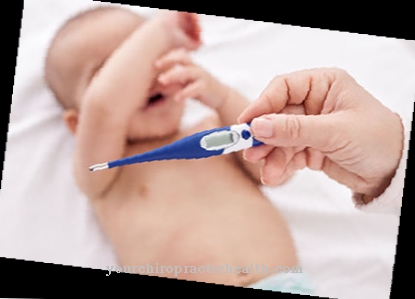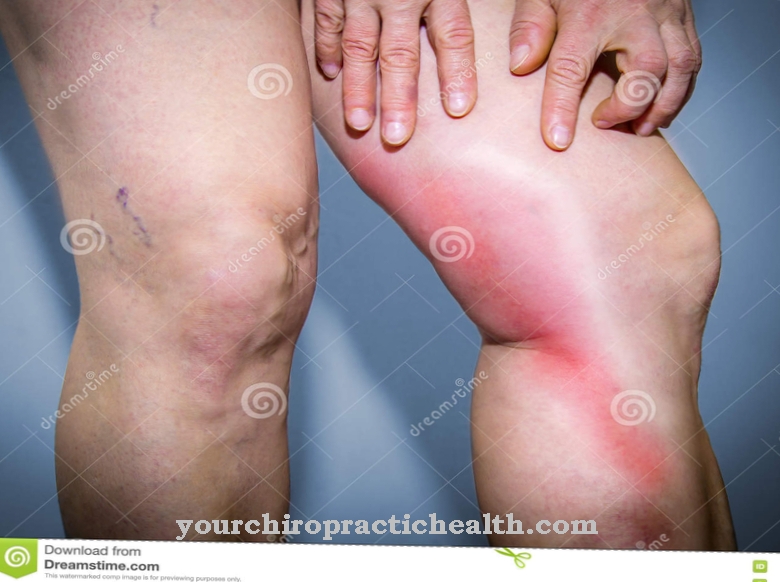A Semen allergy is a rare allergic reaction to male semen. Like any other allergy, it occurs when the immune system is sensitized to certain proteins in semen. Antihistamines are an acute, desensitization a possible permanent cure of the allergy.
What is a semen allergy?

© VectorMine - stock.adobe.com
Although this is very rare, allergic reactions to semen exist in both women and men. This Semen allergy occurs when the body's immune system identifies the proteins in the semen as enemy invaders, such as viruses or bacteria.
The allergic reaction should therefore be noticed after having oral, vaginal or anal sex without a barrier (e.g. condom). Sperm allergy occurs less often in men than in women, but they too can notice an allergic reaction during sex with other men, or even have an allergic reaction to their own sperm.
Symptoms vary, and many people experience itching, redness, and stinging. Sperm allergy can lead to fertility problems because the white blood cells can prevent the sperm from reaching the eggs.
causes
Typically a Semen allergy not noticeable at first contact with semen. Most people can come into contact with semen multiple times before an allergy develops.
The immune system becomes sensitized over a longer period of time and the white blood cells develop immunoglobulin E; an antibody against the protein in semen. Once these antibodies have developed, they react the next time sperm enters and bind to the protein cells. They also ensure the release of certain chemicals, for example histamine, which cause redness, itching, stinging and swelling, i.e. the usual allergic reactions.
People who are allergic to their partner's sperm are usually allergic to any sperm. Straight men can also develop an allergy to their own semen. This usually happens when it comes into contact with your blood, e.g. during a vasectomy.
Symptoms, ailments & signs
Sperm allergy manifests itself as an allergic reaction to contact with semen. However, the sperm is not to be mentioned as an allergen, but a certain protein in the seminal fluid that is common to all men.
The allergic reactions usually occur in affected women between 10 and 30 minutes after contact with the allergen. Symptoms similar to those of hay fever can occur. This includes the urge to sneeze, watery eyes, runny nose and difficulty breathing. However, the contact reactions in the genital area are much more pronounced. This can lead to itching, pain, swelling, redness and rashes. Some women report persistent vaginal contractions after possible contact with ejaculate.
Vomiting or diarrhea can occur. The vegetative symptoms can persist for a long time. In the worst case, contact with the allergen leads to anaphylactic shock. This usually means cardiac arrest, damage to the internal organs and a high risk of death.
Men can also suffer from a sperm allergy, although the symptoms are the same for them as for women. It can also lead to flu-like symptoms. However, you experience these symptoms anew with every ejaculation. In all cases observed, the allergy is limited to one's own ejaculate. Foreign ejaculate caused no discomfort.
Diagnosis & course
When a Semen allergy suspected, the person will usually have a skin test or a special immunoglobulin test. Patients who suffer anaphylaxis from the allergy should be treated immediately with epinephrine. In a skin test, the patient's skin is lightly scratched or pricked and exposed to the allergen. If the patient has a sperm allergy, this shows up in reddening of the skin, similar to a mosquito bite.
The doctor will measure the intensity of the swelling and thus the allergy. A special immunoglobulin test to determine an allergy is much less accurate than a skin test and is usually only used if the patient has a serious skin disease.
Complications
A semen allergy does not always have to lead to special compilations or to complaints. These only occur when the person concerned comes into contact with sperm. This can lead to redness and itching of the skin. Pain can also occur and the skin looks swollen.
Furthermore, the symptoms increase if the contact with the sperm is not interrupted. In most cases the symptoms go away on their own when contact is broken. In severe cases, however, treatment by an emergency doctor is necessary to alleviate the symptoms.
Especially in the case of existing skin complaints, the semen allergy can lead to serious complaints and significantly reduce the quality of life. The semen allergy can also have a negative impact on the relationship with one's partner and possibly lead to tension.
Treatment for this allergy is not always necessary. However, sensitization can also be carried out to alleviate the symptoms. There are no complications. The life expectancy of the affected patient is also not negatively affected by the disease.
When should you go to the doctor?
As a rule, a sperm allergy must always be treated by a doctor. Self-healing cannot occur, so that the person affected is dependent on medical treatment.
A doctor should be consulted if the patient shows signs of an allergy or allergic reaction on contact with semen. This can lead to a strong cold, sneezing or even severe breathing difficulties. Itching or redness on the skin after contact with semen can also indicate a semen allergy and should definitely be examined by a doctor. In severe cases, severe diarrhea or even vomiting can occur. Some people also show symptoms of the flu, which should also be examined if they come into contact with semen.
A general practitioner can usually diagnose a sperm allergy. Further treatment is then usually carried out by an allergist. However, it cannot be predicted whether a complete cure will be possible.
Treatment & Therapy
As a temporary cure from Semen allergy Desensitization is applied. In this method, the patient is exposed to a rising substance of allergens for a certain length of time in order to get the body used to the sperm.
Women who want to get pregnant may have to undergo artificial insemination if this desensitization does not work. Allergy medications such as antihistamines are also used to control symptoms. If pregnancy is not to be achieved, sex with a barrier is recommended, for example with a condom.
In the case of artificial insemination, a sample of the sperm is taken and the specific allergen is removed from the sample. This allergen-free sample is then introduced into the woman's uterus. Desensitization takes place either through the targeted administration of semen from the partner into the woman's vagina, or through an injection of the allergen into the partner's bloodstream at short intervals.
prevention
There is currently no effective prevention Semen allergy. But there are a few ways to reduce symptoms. People with allergies can take antihistamines before sex to reduce symptoms during and after sex.
Wearing condoms also reduces the contact with semen and thus the symptoms. People prone to anaphylaxis should always carry an epinephrine pen with them and instruct friends and relatives to use it.
Aftercare
Sperm allergy is a disease that has not yet been well researched. Scheduled follow-up examinations rarely take place after a diagnosis. The patients themselves are responsible for implementing and taking all measures. Many doctors suspect that there is no cure for semen allergy.
To prevent the effects of symptoms, women can protect themselves by having their sexual partner use a condom. This represents the simplest and most effective aftercare for a sperm allergy. This measure is also suitable for partnerships between men. In addition, mild forms of the disease usually go smoothly if allergy-suppressing drugs are used.
Unlike after a tumor, a semen allergy is not about preventing the disease from recurring. It is known to exist permanently. Rather, the patients should be supported in getting along with their everyday life. Complications such as allergic shock should be avoided.
Long-term treatment involves the use of a condom or suitable medication. A high degree of personal responsibility is required of those affected. The effects of careless behavior on the partner should not be underestimated.
You can do that yourself
People with a sperm allergy can take care of their own responsibility in everyday life not to come into contact with the man's body fluids. In particular, contact of sperm with the skin should be avoided in the affected persons.
At the first touch, the sperm should be washed off as quickly as possible and immediately with running water. The body should be cleansed so that the allergic reactions do not show up at all or only minimally if possible. Simply wiping off the sperm is not enough, as individual elements of the body fluid still remain on the surface of the skin and lead to unpleasant health developments.
When engaging in sexual activity, it is essential to use a condom. In these cases the condom is used not only as a contraceptive to protect against possible pregnancy, but also to avoid coming into closer contact with the body fluid and thus risking an anaphylactic shock.
The partner should be informed of the presence of the allergy prior to intimate contact. Clarification of the possible health consequences should take place at an early stage in order to avoid unpleasant situations or lack of understanding on the part of the partner. If men suffer from semen allergy, they should make sure to change their underwear regularly. In addition, good personal hygiene is important when dealing with the allergy.



.jpg)
.jpg)








.jpg)

.jpg)
.jpg)











.jpg)